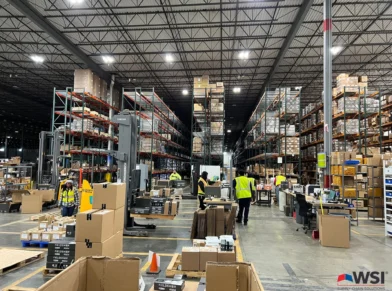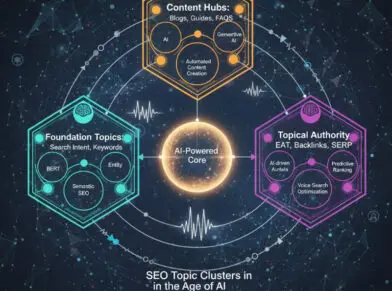SEO Topic Clusters in the Age of AI: Building Topical Authority
Introduction: Why AI is reshaping search and what it means for SEO
Search engines are in the middle of a seismic shift. Google’s AI Overviews and similar generative features use large language models to summarize answers directly in the search results. As of mid‑2025, AI Overviews appear in roughly 15% of all Google searches, and the feature is growing quickly. Visibility has increased, but clicks to websites have not—organic click-through rates drop by about four times when AI summaries are present.
Meanwhile, non‑Google channels like ChatGPT and Perplexity are gaining traction; ChatGPT is already the world’s 5th most‑visited site, and Generative AI is projected to increase marketing productivity by a whopping $460 billion over the next ten years. This “Great Decoupling” (the huge disparity between search engine impressions and clicks) means brands can be highly visible but still receive less traffic. This puts unprecedented emphasis on being cited in AI answers.
Traditional SEO alone isn’t enough in this environment. AI search engines break a query into multiple sub‑queries (the query fan‑out technique) and stitch information from many passages into a single answer. Google’s AI Mode introduces reasoning models, passage‑level retrieval, and personalization, so being the best page for one keyword doesn’t guarantee you’ll appear in generative results. Topic clusters—organized sets of content built around a central theme—help you earn topical authority and make your content easier for AI to understand. This article explains what topic clusters are, why they matter for AI‑driven search, and how to build a future‑proof cluster strategy for your business.
What Are Topic Clusters?
A topic cluster is like an organized section of a bookstore. The pillar page is the shelf labelled “Fitness,” and each cluster article is a book on a related subtopic, such as “Strength Training” or “Meal Plans.” Everything links back to the pillar page and between related articles. This structure signals to search engines and AI systems that your site covers a topic in depth and provides visitors with clear paths to explore. A basic topic cluster consists of:
- Pillar page: A long‑form, high‑value page covering a broad topic; it should include a table of contents, internal links to sub‑pages, and clear calls to action. Pillar pages help search engines categorize your site and build authority.
- Cluster pages: Shorter articles that dig into specific subtopics and user intents. They should interlink and point back to the pillar page.
- Internal linking: Links from cluster pages to the pillar signal importance; links from the pillar back to clusters distribute authority throughout the cluster.
Topic clusters should not be confused with content clusters, which simply inventory all mentions of a topic across your site. Content clusters may list pages on pricing, data sheets, or webinars, but they rarely convince readers that you truly understand the subject. Topic clusters, on the other hand, go deep on a subject, addressing variants, synonyms, related subtopics, and the questions your audience is asking. They are built around user intent—navigational, informational, commercial, transactional, and local—and align with Google’s E‑E‑A‑T guidelines (expertise, experience, authoritativeness, and trustworthiness).
Why Topic Clusters Matter for AI SEO
AI search platforms don’t just match keywords; they interpret content semantically. Here’s why topic clusters help your website when it comes to AI SEO.
Semantic understanding: When an AI sees 5–10 interlinked pages around a central theme, it recognizes topical authority and depth. Clusters show that you’re not just using keywords—you understand the topic. This increases your chances of being quoted in AI‑generated answers and improves visibility across a range of long‑tail queries.
Structured relevance: Google’s generative search features break complex queries into sub‑questions and look for content that answers each part. AI Mode’s reasoning models pull information from multiple passages, so a single page optimized for one keyword may not be enough. A robust topic cluster provides answers for many sub‑queries and signals structured relevance to AI systems. In the age of AI, being cited matters more than being clicked.
Visibility beyond SERPs: AI is becoming the homepage for search. Appearing in AI answers may soon matter more than your position in traditional results. As AI Mode and AI Overviews reduce clicks, topic clusters help your brand stay visible by ensuring your content is included in these AI summaries.
Match new ranking factors: Modern ranking systems prioritize intent over keywords, semantic understanding, entity relationships, and personalization. Google uses over 200 ranking factors and makes thousands of algorithm changes annually. AI SEO adapts to these updates by predicting search trends and modelling user intent; about 51% of marketers already use AI tools to optimize content. Clusters align your content with these signals, improving your chances in both AI and traditional search.
Building a Topic Cluster Content Strategy
A successful topic cluster strategy combines thorough research, thoughtful architecture, and continuous optimization. Here’s a step‑by‑step framework you can apply today.
1. Research your topics and users
Before writing a single article, gather as much information as possible. For the core service or product, use Google Trends, Google Keyword Planner, third‑party tools like Ahrefs, and competitor site architecture to understand how others organize their content. For user‑focused content, expand your research to include social‑media listening, Google Autocomplete, SERP analysis, and good old‑fashioned customer conversations. This hunter‑gatherer phase helps you uncover synonyms, related queries, pain points, and questions. Search for content gaps vs. your competitors, variants, and questions to address.
2. Choose a pillar topic and subtopics
Select a broad theme that aligns with your product or expertise—this becomes your pillar page. Then map out clusters around specific user intents. Think of a hub‑and‑spoke model: the hub is your pillar, and each spoke is a cluster page targeting a narrower subtopic. Depth doesn’t have to be uniform; some spokes may have several sub‑topics and others just a few. Organize your clusters by sales‑funnel stages—top of funnel (awareness), middle (consideration), and bottom (purchase). Each stage should have content that matches the user’s intent: thought‑leadership and definitions at the top, comparison guides in the middle, and product pages or demos at the bottom.
3. Create comprehensive content
Write your pillar page to cover the subject comprehensively. Address multiple user intents and include a table of contents, internal links, and clear calls to action. Cluster pages should explore subtopics in depth; this isn’t just about chasing long‑tail keywords but answering specific questions. Use questions from your research as sub‑headings or stand‑alone posts. Optimize each page for clarity—AI systems prefer concise, well‑structured passages. Where appropriate, incorporate varied media—videos, infographics, or audio—to align with multimodal search.
4. Implement internal linking
Link every cluster page back to the pillar page to signal its importance and distribute authority. Likewise, link from the pillar to each cluster page, and cross‑link between clusters where relevant. Use descriptive anchor text that clearly indicates the destination. A coherent internal linking structure makes it easier for search engines to crawl and for AI models to stitch together related passages during query fan‑out.
5. Optimize and monitor performance
Publishing is only the beginning. Review how your cluster performs in traditional SERPs and AI results. Check ranking shifts, traffic patterns, AI search visibility, and user engagement. Adjust your clusters as AI results evolve—add new spokes when new technologies (e.g., AI tools) appear, update older content, or prune pages that no longer drive engagement. Tools like in‑house analytics can help compare your topic coverage against competitors and identify vocabulary gaps. Remember, AI systems evaluate topical authority over time, so consistent improvements pay off.
Content Clustering Best Practices
Beyond the step‑by‑step plan, keep these best practices in mind:
- Cover the entire topic: Go beyond counting pages. Address variants, synonyms, related concepts, and questions your audience might ask. The only way to gauge your authority is to analyse topics holistically.
- Align with user intent: Use the five search intents (navigational, informational, commercial, transactional, and local) to frame your content. Top‑of‑funnel content can include guides and how‑tos; mid‑funnel might include case studies or product comparisons; bottom‑funnel should encourage conversions.
- Optimize for E‑E‑A‑T: Highlight your expertise and real‑world experience. AI search systems increasingly favour content that demonstrates expertise, experience, authority, and trustworthiness. Include original data, case studies, interviews, or customer stories to stand out.
- Write for AI and humans: Keep paragraphs short (two to four sentences) and use clear language. Bullet points and descriptive headings help AI models parse content while improving readability for users.
- Keep your content fresh: AI algorithms constantly learn from new data. Regularly update your cluster to reflect emerging trends, new tools, and changing user questions. For example, almost every tech industry created AI‑related spokes in the last year—don’t let your content become stale.
SEO Topic Clusters vs. Old Keyword‑First SEO
Classic SEO revolved around high‑volume keywords, backlinks, and metadata. Modern AI‑driven search prioritizes intent, semantic relationships, and personalization. AI algorithms focus on understanding the meaning behind queries rather than matching exact terms. RankBrain and BERT, which are machine learning models, understand how words relate to each other in sentences. This helps us optimize for entities, meaning we connect concepts rather than just focusing on individual keywords. Instead of just comparing things one by one, a list-wise approach looks at how multiple pages rank all at once.
Today’s AI, like Google’s query fan-out, runs many hidden queries for every user question. So, we’re not just ranking for one keyword anymore; we’re providing good info across a large number of sub-queries. AI Mode discourages external clicks, shifting SEO from a traffic‑generation channel to a brand‑visibility channel. This doesn’t make keywords irrelevant—keywords still matter as part of a larger topic—but they are secondary to topical authority and user intent. Topic clusters are a smart move for the long haul, especially with AI, because they just make sense with how AI handles questions and puts together answers.
How to Future‑Proof Your SEO with Clusters
As search shifts from retrieval to reasoning, you need to adapt. Here’s how to ensure your clusters stand the test of time:
- Focus on being cited, not just clicked. AI search surfaces emphasize zero‑click behavior. Make your content the best possible answer to user questions, even if users stay in the AI chat. Provide clear explanations, examples, and evidence that an AI model can quote.
- Monitor AI visibility metrics. Track how often your pages are cited in AI Overviews or ChatGPT prompts, not just their ranking. Tools for measuring AI search visibility, (like BrandVisibility.ai) are still emerging, but you can use PeopleAlsoAsk queries and manual testing.
- Optimize passages, not just pages. AI Mode retrieves information at the passage level. Break long paragraphs into focused sections that answer specific sub‑questions. Use headings and lists to structure information, making it easy for AI models to extract.
- Leverage multimodal content. Generative search is multimodal, incorporating video, images, and transcripts. Include visuals and transcripts in your cluster strategy so your information is available across formats.
- Partner with experts. Navigating AI‑driven SEO can be complex. At Globe Runner, we specialize in building topic clusters that strengthen authority and prepare your site for AI search. Our SEO services and content marketing solutions integrate research, strategy, and ongoing optimization to ensure your content is structured for both AI and human audiences. Whether you need help mapping your pillar pages, conducting deep keyword and intent research, or implementing a robust internal‑linking scheme, we’ve got you covered.
What are topic clusters in SEO?
A topic cluster is an organized group of content built around a central pillar page that covers a broad subject. Supporting cluster pages explore related subtopics in depth and interlink with the pillar and with each other. This structure helps search engines and AI systems recognize topical authority and improve user navigation.
How do SEO topic clusters help with AI search?
AI search uses semantic understanding and query fan‑out. Clusters provide multiple passages covering different sub‑queries and show AI models that you understand the topic, which increases the likelihood of being cited in AI answers. Well‑linked clusters also make it easier for search engines to crawl and for generative algorithms to stitch information together.
What’s the difference between content clustering and keyword targeting?
Keyword targeting focuses on ranking for specific search terms and often produces isolated articles. Content clustering inventories pages that mention a topic but may not demonstrate depth. Topic clusters emphasize topical authority—they cover a subject comprehensively, align with user intent, and link related content together. In AI‑driven search, this holistic approach is more effective because AI models evaluate relevance across many sub‑queries rather than single keywords.
Conclusion: Embrace the AI‑powered future
Search is evolving from a keyword‑matching game to a reasoning‑driven, multimodal experience. AI Overviews and AI Mode reduce clicks but elevate the importance of being cited. By organizing your content into strategic topic clusters, you signal topical authority, cover diverse user intents, and make your site more useful to both human readers and AI systems.
Clusters help you adapt to trends like query fan‑out, passage‑level retrieval, and personalization. They also future‑proof your SEO by moving beyond short‑term keyword tactics to long‑term topical authority. Whether you’re a marketing manager, business owner, or digital strategist, now is the time to invest in structured, intent‑driven content. We can help— contact us to learn how Globe Runner can design a topic cluster strategy that keeps you visible in the age of AI. Schedule a call with us today.
Maximizing Paid Media ROI in an AI-First World
Thanks to artificial intelligence (AI), digital marketing is changing faster than ever. This isn’t just another trend; it’s a fundamental shift in how businesses connect with customers. This means marketers have to rethink how to get the most value out of our ad spend. The goal is to maximize paid media ROI, or Return on Investment.
ROI is simple: it’s about making more money back than you put in. It’s the ultimate measure of a campaign’s success. In today’s AI-first world, Globe Runner is at the forefront of these changes, and we are using every tool in our arsenal to help us maximize ROI for our clients.
The New ROI Landscape in an AI-First Era
The old methods of running ads—like manually setting bids and targeting broad groups of people—are quickly becoming obsolete. AI is changing everything. It’s giving us smarter ways to measure what works, find the right audience, and optimize campaigns around the clock.
If you’re trying to manage campaigns without AI, you’re likely facing some tough challenges. You could be wasting money on ads that don’t convert or missing out on key customers because you can’t reach them with the right message. This can seriously hurt your digital marketing ROI. AI helps by constantly analyzing data, finding the most efficient path to success, and lowering your cost-per-acquisition (CPA) while boosting your return on ad spend (ROAS).
Leveraging AI to Increase Paid Media ROI
Think of AI as a powerful assistant that never sleeps. It helps you improve marketing ROI in several key ways:
Smarter Targeting: AI can analyze massive amounts of data to pinpoint exactly who is most likely to buy your product. It looks at online behavior, interests, and purchase history to find your ideal audience, ensuring your ads reach the right people. This precision means less wasted ad spend and a better ROI in digital marketing.
Real-Time Optimization: AI can automatically adjust bids and budgets in real-time based on performance. If an ad is performing well, it will get more money. If not, the budget shifts elsewhere. This constant, data-driven fine-tuning helps you optimize paid media campaigns for ROI.
Predictive Analytics: AI can use past data to predict what will happen in the future. This allows you to make smarter decisions about your budget and strategy before you even launch a campaign. Knowing how to increase ROI before you start is a huge advantage.
Spotlight: Google’s AI Max Ads
The rise of AI in marketing is best seen in Google’s push toward more automated campaigns. One of the newest and most interesting examples is the set of AI-powered features for your traditional Search campaigns, often referred to as “AI Max.” These features go beyond your standard ad formats. They use AI to generate longer headlines automatically, dynamically select the best landing pages on your site, and find relevant search queries you might have missed.
According to sources like Search Engine Land, these ads are showing promising results. In some cases, ad content pulled from a company’s blog led to a higher ROAS than ad content taken from a standard landing page. This could be a game-changer because it automates a lot of the creative work and content sourcing.
It’s important to note these ads are different from Google’s Performance Max (PMax) campaigns, which are another powerful AI-driven tool. While AI Max for Search is designed to supercharge your Search campaigns, PMax is a single campaign type that runs ads across all of Google’s inventory—including Search, YouTube, Display, and more. You provide the creative assets and audience signals, and Google’s AI automates the bidding and placement to find and convert customers wherever they are. PMax is a great option for businesses looking for an all-in-one solution to maximize their reach and conversions.
PMax campaigns do come with a few drawbacks. Advertisers say these ads come with a lack of granular control and limited reporting, as Google’s AI operates as a “black box” that determines where to place your ads. This can lead to your ads showing up on irrelevant sites or for broad search queries, and it can be difficult to diagnose exactly what is and isn’t working.
Here are a few quick tips for marketers:
- Audit Your Blog Content: Since AI Max can pull from your blog, make sure your articles are high-quality and on-brand. They could become part of your next ad.
- Test AI-powered features: Don’t be afraid to try new AI tools. For example, try the “final URL expansion” feature on PMax campaigns to see how this affects your campaign’s performance.
- Monitor Ad Previews: Keep a close eye on your ad previews to make sure the messaging and tone are consistent with your brand.
From Data to Strategy: Building a Future-Proof ROI Framework
True success comes from a unified strategy that goes beyond just one platform. To get the maximum paid media ROI, you need to integrate AI insights across all your channels—Google Ads, paid social media advertising (like Meta, LinkedIn), and more. A unified view of your campaigns helps you avoid common pitfalls like duplicate efforts or overspending in one area. By making sure your budget works together toward a single goal, you create a more powerful and efficient strategy.
This kind of holistic approach also relies on better measurement. If you’re asking how to improve marketing ROI, the answer often lies in understanding the full picture. AI-powered attribution models help you do just that, showing you exactly which ads influenced a sale, even if a customer saw multiple ads before converting. By setting clear goals and using automated dashboards, you can get faster insights and make smarter decisions based on real data.
Finally, to future-proof your paid media investments, you must accept that the digital world is always changing. The key to long-term success is to balance human creativity with AI automation. While AI can handle the data and optimization, you can’t just “set it and forget it.”
This is especially true for lead generation. AI-managed campaigns can bring in leads, but not all leads are created equal. It’s essential to regularly review the quality of those leads and make manual adjustments to your strategy when necessary.
Human expertise in understanding your customer and your business goals is irreplaceable. This flexible approach will ensure your campaigns remain profitable and adaptable no matter what comes next. Use AI for the data and optimization, and use human expertise for the high-level strategy, brand voice, and creative vision. This flexible approach will ensure your campaigns remain profitable and adaptable no matter what comes next.
FAQ on Maximizing Paid Media ROI
What is paid media ROI, and why does it matter?
Paid media ROI measures the return on your ad spend. It’s crucial because it tells you if your advertising is profitable and if it is helping your business grow.
How can AI help improve paid media ROI?
AI boosts ROI by making campaigns smarter. It uses data to find the right audience, bid the right amount at the right time, and predict future trends, all of which lead to better results.
What are the best strategies to optimize ROI in digital marketing?
The best strategies involve using AI for precise targeting, real-time optimization, and data-driven decisions.
How do I measure and track paid media ROI effectively?
You track ROI by comparing your ad spend to the revenue generated. Using AI-powered attribution models and centralized dashboards helps you see this data more clearly.
Which AI tools are best for increasing marketing ROI?
Many platforms, like Google Ads and Meta, have built-in AI tools. There are also third-party platforms that specialize in things like audience segmentation and bid management.
Boost Your ROI with Globe Runner’s Paid Media Expertise
Navigating this new AI-driven world can be challenging, but you don’t have to do it alone. At Globe Runner, we have extensive experience using these new strategies to help businesses optimize paid media campaigns for ROI.Ready to see how we can help you get better results? Schedule a call today for a free campaign audit or consultation.
AI and the Future of SEO: What’s Next?
The way we search online is evolving faster than ever, and artificial intelligence (AI) is at the center of this transformation. AI is reshaping how search engines operate, how marketers develop strategies, and how consumers find information. For businesses aiming to stay competitive in this quickly changing landscape, understanding the role of AI in search engine optimization (SEO) is no longer optional; it’s essential.
At Globe Runner, we’ve embraced these changes by integrating cutting-edge AI techniques into our SEO strategies. Whether it’s optimizing content, analyzing data, or staying ahead of algorithm updates, we’re here to guide your business into this exciting new era with measurable, values-driven results.
Let’s explore how AI is transforming the SEO industry and what it means for businesses and marketers who want to thrive in the digital world.
Exploring the Synergy Between AI and SEO
AI and SEO are becoming inseparable. Thanks to advancements in machine learning and natural language processing, AI tools are revolutionizing traditional approaches to optimization. These tools learn and adapt, producing smarter, faster results. For instance, platforms like AI-powered keyword discovery tools now help businesses identify hidden opportunities that were once hard to find with manual methods.
Why does this synergy matter? It means improved precision and efficiency. When expertly wielded, AI tools can perform analysis that used to take hours in just minutes, freeing up time to focus on creating impactful strategies. At Globe Runner, we specialize in integrating AI seamlessly into your SEO campaigns so we can focus on what truly matters—connecting with your audience.
AI-Enhanced Content Strategies
When it comes to content marketing, AI is a game-changer. While Globe Runner does not typically use AI-written content, these tools can be useful to research and identify ways to improve existing and new content our writers create. From keyword research to on-page competitor analysis to analytics, AI is helping SEO professionals up their game. Here are some examples:
- Advanced Keyword Research: AI can analyze vast datasets of search queries, trending topics, and competitor strategies to identify high-impact, long-tail, and emerging keywords that human analysis might miss.
- Understanding Search Intent: More than just keywords, AI can delve into the intent behind searches (informational, transactional, navigational, commercial investigation). This helps align your existing content with what users are truly looking for, leading to higher rankings and better engagement.
- Content Gap Analysis: AI can pinpoint topics or questions that your audience is searching for but that your current content doesn’t adequately address, guiding your content strategy.
- Internal Linking Strategies: AI can analyze your website’s existing content and suggest strategic internal links, helping distribute link equity, improve site navigation, and signal topic authority to search engines.
- Backlink Opportunities: AI can analyze competitor backlink profiles to uncover potential link-building opportunities for your site.
At Globe Runner, we view great content as fuel for success. Whether you’re optimizing existing pages or building new ones, our AI-enhanced services ensure that your message cuts through the noise and ranks well on Google and Bing.
Harnessing AI for Advanced Data Analysis
AI doesn’t just optimize your content; it transforms how we analyze data to refine SEO strategies. SEO generates mountains of information—from keyword rankings and website traffic to user behavior metrics. With AI, interpreting this data becomes much quicker and more accurate.
Through machine learning, these tools identify patterns and provide actionable insights. For example, AI algorithms can detect subtle changes in search trends or evaluate how your competitors are performing. This allows you to adjust your strategy proactively, not reactively.
By leveraging advanced AI data tools, Globe Runner ensures our clients stay miles ahead of their competition. Whether it’s ongoing monitoring or strategy recalibration, our job is to turn data into decisions that fuel growth.
The Impact of AI on Search Algorithms
Search engines themselves are becoming smarter, with AI driving many of their advancements. Google’s introduction of RankBrain and its more recent algorithms have fundamentally changed how websites are ranked. Search engines are moving beyond basic keyword matches; they now focus on intent and context.
This shift has a ripple effect on SEO strategies. For instance, optimizing for AI-powered search requires a deeper understanding of searcher needs and the ability to answer questions in relevant, eloquent ways. From improving page experience to creating voice-search-friendly content, businesses must stay flexible.
Globe Runner positions our clients to succeed in this challenging terrain. By monitoring how AI impacts search algorithms, we help tweak your strategy to meet evolving requirements, ensuring that you stay visible to your target audience.
AI Predictive Models: Shaping the Next Phase of SEO
Using predictive models, AI doesn’t just analyze the past; it forecasts what’s likely to come next. Imagine being able to anticipate market trends, search patterns, and SEO opportunities before they fully emerge. That’s the power of AI in predictive modeling, and it’s revolutionizing the way businesses approach marketing.
Predictive SEO allows businesses to play offense instead of defense. By using AI to study historical data and current trends, marketers can develop content and campaigns designed to succeed in the future. This not only boosts ROI but also helps businesses establish themselves as thought leaders in their industries.
Our AI Discovery Services Put Your Brand on ChatGPT, MetaAI & More
At Globe Runner, we blend cutting-edge tools with forward-thinking strategies to ensure our clients stay ahead of the curve. One example is our new AI discovery services which keep your brand at the forefront of the AI landscape.
To remain competitive, your business must be visible not just in search engines queries, but within the AI searches as well. That’s why Globe Runner now offers an AI visibility service that provides a crucial advantage. This service optimizes your business’s information for inclusion in our proprietary AI discovery database. This database serves as a reference library for AI search responses across various prominent platforms like Google’s Gemini, SearchGPT, Meta AI, and Bing’s Copilot. By becoming a part of this database, your company is available to be referenced and to appear prominently in AI-generated answers. Rather than just appearing on the list of links on search engine results pages, your company becomes a direct source of information for AI queries. This ensures that when AI systems synthesize information for users, your business is a recognized and authoritative entity within their knowledge base.
To complement this groundbreaking discovery service, Globe Runner has developed an innovative AI Rank Tracking tool. Just as traditional SEO rank trackers monitor keyword positions on Google or Bing, our AI search rank tracker provides clients with detailed insights into their performance within leading AI platforms. This tool will show how frequently and effectively your company, products, and services are referenced in AI-generated responses across platforms like Gemini, ChatGPT, Copilot, and Perplexity AI. This real-time monitoring allows you to understand your company’s AI search visibility, identify areas for improvement in your AI discovery strategy, and track the impact of your efforts in this critical new search frontier. You’ll gain the actionable data needed to continuously refine your presence in the AI search ecosystem and ensure your business remains top-of-mind for AI-driven user queries.
The Debate: Will AI Replace Human-Led SEO?
A common question in the industry is whether AI will eventually replace human SEO professionals. While AI has made giant strides in handling repetitive tasks and data-heavy analysis, it excels more as an augmentative tool than a standalone solution.
Why? Because SEO is not just about numbers or trends, it’s about understanding people. Human creativity and strategic thinking are irreplaceable in developing compelling branding and messaging. The most successful SEO efforts rely on humans and machines working in harmony.
This belief is at the core of Globe Runner’s approach. We use advanced AI tools to streamline processes but leave the big-picture strategy and creative work in the capable hands of our team of experts.
AI and the Future of SEO FAQs
How is AI currently being utilized in SEO?
AI is being used for keyword research, keyword research, competitor analysis, predictive modeling, and refining search engine algorithms.
Can AI improve the efficiency of SEO tasks?
Absolutely. AI speeds up time-consuming tasks like keyword discovery and metadata creation, allowing marketers to focus on strategy and creativity.
Will AI eventually replace human SEO professionals?
Unlikely. AI complements human expertise by handling repetitive tasks and analyzing data, but human creativity and strategic planning remain essential.
How can businesses prepare for the integration of AI in SEO?
Start by identifying AI tools that align with your goals. Consulting with an agency like Globe Runner ensures you adopt the right technology while implementing best practices.
Elevate Your SEO with Globe Runner’s AI Expertise
The future of SEO is here, and it’s powered by AI. For businesses ready to adapt and thrive, incorporating AI into your digital marketing strategy isn’t just a competitive advantage; it’s a necessity. At Globe Runner, our team of SEO and AI experts works with you to design customized strategies that drive measurable results.From AI-powered tools to advanced optimization techniques, we provide everything you need to succeed in this brave new world of SEO. Ready to take the first step? Contact Globe Runner today to learn how we can elevate your digital presence with next-generation AI strategies. Let’s fuel your business’s success and ensure you soar above the competition.
How AI is Transforming the Customer Experience
Artificial intelligence (AI) is revolutionizing the way businesses interact with their customers. By harnessing the power of AI, companies can deliver omnichannel, personalized experiences, streamline processes, gain valuable insights into customer behavior, and make changes that will promote engagement and improve experiences. From intelligent chatbots that provide instant support to recommendation engines that suggest products tailored to individual preferences, Artificial Intelligence is reshaping the customer journey and setting new standards for exceptional service. Let’s explore the ways in which AI is helping companies better connect with their customers.
Personalized Experiences
Artificial Intelligence can analyze customer data to predict their future preferences and behaviors, enabling businesses to offer highly personalized recommendations across all channels, whether it’s suggesting products on a website or recommending relevant content on a social media platform. This tailored approach can lead to increased sales and customer loyalty by providing customers with relevant and engaging recommendations.
Better Product Recommendations
AI transforms the customer experience by offering personalized recommendations and tailored interactions that resonate with individual preferences. If a customer frequently purchases running shoes and has recently viewed a marathon training plan, an AI system could recommend a new pair of running shoes specifically designed for long-distance runs.
Collaborative filtering techniques can analyze similarities between customers to suggest products or services that others with similar preferences have enjoyed. This personalized approach can lead to increased sales and customer loyalty by providing customers with relevant and engaging recommendations.
Dynamic Content Personalization
AI can dynamically adjust website content or app interfaces based on user behavior and preferences, providing a more customized, relevant, consistent experience across all channels. For instance, a travel website could display tailored recommendations for hotels and attractions based on a user’s previous search history and location. Furthermore, AI can generate tailored product descriptions that highlight features most relevant to each individual customer, making the shopping experience more engaging and relevant.
Personalized Marketing
AI can help businesses identify the most relevant channels and messaging for reaching specific customer segments, resulting in more targeted and effective marketing campaigns. For example, a fashion brand could use AI to target ads for a new line of sustainable clothing to customers who have previously expressed interest in eco-friendly products.
Moreover, Artificial Intelligence can personalize email content based on individual recipient’s interests, purchase history, and behavior, leading to higher engagement and conversions. And, AI chatbots can use purchase or search history to recommend relevant products or services to customers during their support interactions, increasing the likelihood of additional purchases.
By leveraging these and other AI-powered techniques, brands can create more engaging, relevant, and satisfying customer experiences that drive loyalty and sales.
Efficient Customer Service
AI is revolutionizing customer service by automating tasks, improving response times, and providing personalized support. Here are some key ways Artificial Intelligence can enhance the customer service experience.
Scalable, 24/7 Service & Faster Response Times
Because Artificial Intelligence can understand and respond to customer queries in natural language, AI-powered chatbots and virtual assistants can handle customer inquiries round-the-clock, providing instant responses to common questions and eliminating the need for human agents to be available at all times. These intelligent assistants can also perform tasks like scheduling appointments or tracking orders, enhancing customer service efficiency.
AI can handle large volumes of customer inquiries without compromising service quality, ensuring a consistent customer experience even during peak times. And, it can help businesses allocate resources effectively by identifying peak demand periods and adjusting human staffing accordingly, optimizing operational efficiency.
Proactive, Personalized Support Across All Channels
AI-powered chatbots can provide congruent support messaging across all channels, such as websites, messaging apps, and in-app chat, analyzing customer data to predict potential issues and proactively address them before they escalate. With the ability to become familiar with a user’s questions and topics of interest, bots can tailor support by suggesting relevant resources, products, or services that enhance the overall customer experience. Additionally, AI can detect and respond to customer cues in order to provide empathetic and personalized support.
When a chatbot encounters a complex issue, it can seamlessly hand off the conversation to a human agent, ensuring a smooth transition. What’s more, AI tools can provide real-time customer service coaching to live agents, helping them provide even better, more individualized service.
Better Customer Loyalty Programs
AI can significantly enhance customer loyalty programs by providing businesses with deeper insights into customer behavior, enabling personalized rewards and experiences, and optimizing program effectiveness.
Personalized Rewards and Experiences
Artificial Intelligence can analyze customer data to identify individual preferences and tailor rewards accordingly. By understanding customer needs, businesses can offer personalized promotions and discounts that are more likely to drive engagement. Additionally, AI can help create exclusive experiences for high-value customers, fostering stronger loyalty and advocacy.
Customer Segmentation
AI can identify different segments of loyal customers based on their behavior and engagement level, enabling businesses to create tiered loyalty programs that offer varying levels of benefits to each segment. This tailored approach can enhance customer loyalty and satisfaction.
Fraud Detection
Artificial Intelligence can detect and prevent fraudulent activity in loyalty programs, such as unauthorized account access or reward abuse which protects the integrity of their loyalty programs and maintains customer trust.
By utilizing AI, businesses can create more effective and engaging loyalty programs that foster customer loyalty, drive repeat business, and improve overall profitability.
Enabling Better Customer Experiences Through Analytics Insights
AI arms businesses with powerful tools that provide deeper insights into customers, enabling you to make data-driven decisions and improve your offerings. Here are some key ways Artificial Intelligence contributes to enhanced customer understanding:
Data Analysis, Visualization & Segmentation
Artificial Intelligence can identify distinct customer segments based on shared characteristics, such as demographics, preferences, and behaviors. This enables businesses to develop targeted messaging that resonate with specific customer groups, improving the effectiveness of their marketing efforts.
AI can process and analyze vast amounts of customer data – like purchase history, website behavior, social media interactions, and survey responses – from all channels, creating dashboards and reports that makes complex data easy to understand and use to make decisions. This gives businesses valuable insights into customer behavior and preferences, enabling personalization that goes far beyond product and service recommendations.
Predictive Analytics
AI can use historical data to predict future customer behavior, such as purchase likelihood, churn rate, and product preferences. This enables businesses to implement proactive measures, such as targeted retention campaigns or product recommendations, to improve customer satisfaction and loyalty.
Sentiment Analysis
AI can analyze customer feedback, social media posts, and reviews to gauge their sentiment and identify areas for improvement. This enables businesses to understand customer attitudes and address negative feedback promptly, improving customer satisfaction (and your reputation).
Customer Journey Mapping
Through the creation of graphics that identify touchpoints of the customer journey, AI can help find areas where the experience could be improved, across all channels from website to app to social media platforms. This enables businesses to better understand the customer journey and optimize interactions at each stage, enhancing customers’ satisfaction and their overall experience.
With the help of these AI-powered learnings, businesses can gain a competitive advantage, improve customer satisfaction, and drive growth.
Final Word: The AI Buying Experience Starts with Search
There’s no doubt, Artificial Intelligence is revolutionizing the customer experience. The possibilities are vast, and as AI continues to evolve, we can anticipate even more innovative and effective ways for brands to connect with their customers.
AI is already changing the way we get our information online. The world’s most popular search engine, Google, now provides AI-generated answers at the top of many of its search results pages and OpenAI is testing SearchGPT, their prototype for an AI search engine powered by ChatGPT. Rest assured, AI will only become more prevalent in search in the future.
As the technology progresses, AI search tools are poised to become indispensable for consumers and businesses seeking information and making purchase decisions. Companies who are quick to adapt to these changes will reap the benefits of greater visibility while those that don’t are at risk of losing out to their competitors.
Ready to revolutionize your business with AI search? Globe Runner‘s AI Discovery Service, the only service of its kind, can put your products and services at the forefront of the future of AI-powered search. Schedule a consultation or contact us today to learn more about how AI search can transform your business.

Globe Runner CEO, Eric McGehearty, speaks to groups and conferences on the future of AI, the future of search, their related technologies, and their impact on our world. Contact us today to learn more.












